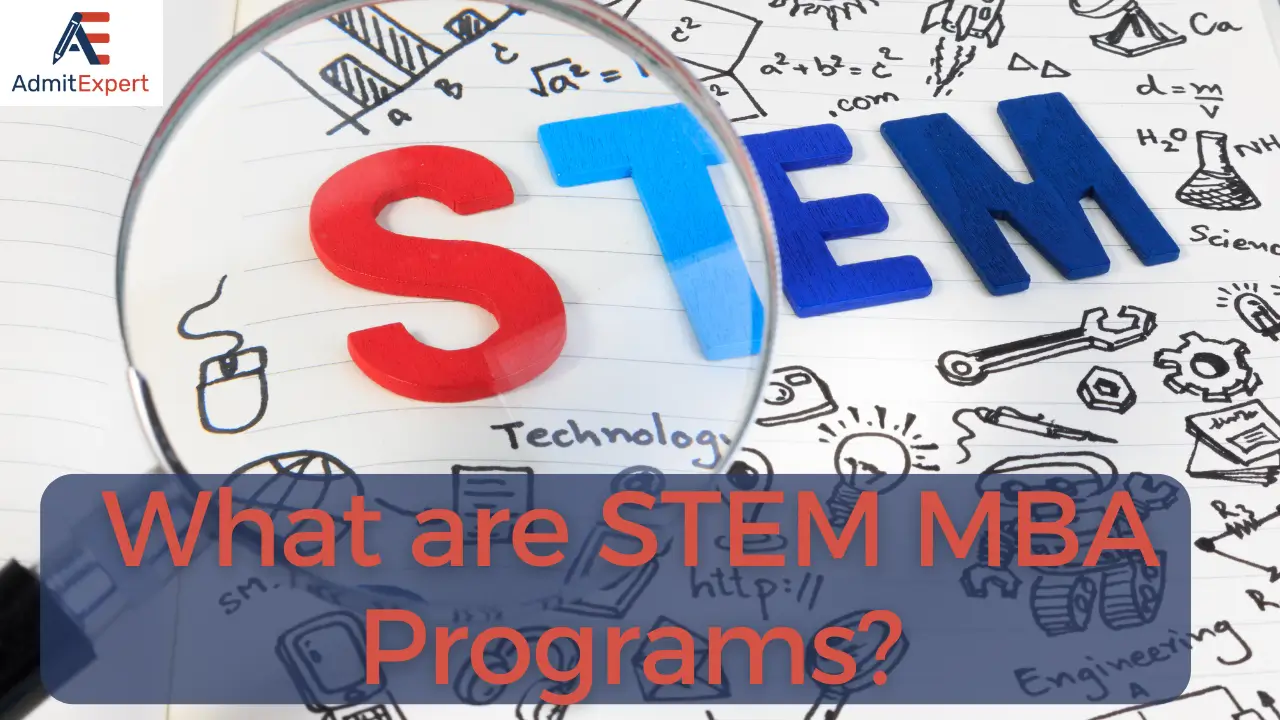As the global economy becomes increasingly driven by technology and innovation, companies in the STEM fields—science, technology, engineering, and mathematics—are playing a pivotal role in shaping the future. From developing cutting-edge software to advancing medical technology, the demand for professionals with a strong background in STEM is higher than ever. However, thriving in this fast-paced industry requires more than technical expertise. Businesses in STEM need skilled leaders who can manage budgets, lead diverse teams, and drive strategic growth. This is where STEM MBA programs come into play.
A STEM MBA offers a unique blend of essential business skills and specialized knowledge in the STEM sector, preparing graduates to take on leadership roles in both STEM and non-STEM industries. With the U.S. Bureau of Labor Statistics projecting a 10.4% growth in STEM jobs between 2023 and 2033—far outpacing the 3.6% growth in non-STEM fields—the appeal of a career in STEM is undeniable. Whether aspiring to manage tech startups, lead engineering teams, or oversee operations in biotech firms, a STEM MBA equips students with the tools needed to succeed in this rapidly growing sector.
In this comprehensive article on STEM MBA we explore why to pursue a STEM MBA, the pros and cons of STEM MBA in USA, job data, comparisons with traditional MBA programs, business schools in the USA offering STEM MBA, the admissions process, and answers to frequently asked questions.

What are STEM MBA programs?
STEM is an acronym for Science, Technology, Engineering, and Mathematics.
Technically, a generic MBA program does not fall in the STEM category.
STEM MBA programs are designed to integrate business education with a strong emphasis on science, technology, engineering, and mathematics. This unique combination equips graduates with the skills to tackle complex business challenges using advanced analytical and technical approaches.
Why Pursue a STEM MBA?
A STEM MBA integrates rigorous business education with a focus on STEM disciplines, equipping graduates with a unique skill set highly valued in the modern economy. Here are some compelling reasons to pursue a STEM MBA:
- Increased Job Opportunities: STEM MBA graduates are in high demand across various industries, including technology, finance, healthcare, and consulting.
- Enhanced Skill Set: Combining business acumen with technical expertise enables graduates to tackle complex problems and drive innovation.
- Higher Salaries: The unique combination of skills often leads to higher starting salaries and more lucrative career trajectories.
- STEM OPT Extension: International students benefit from an additional 24-month OPT (Optional Practical Training) extension, allowing them to work in the U.S. for up to three years post-graduation.
- Versatility: A STEM MBA opens doors to a wide range of roles, from data analytics and product management to strategic consulting and leadership positions in tech companies.
Business Schools offering STEM MBA programs
| School Name | STEM MBA Program Name | Duration | Tuition Fees (Approx.) |
|---|---|---|---|
| Harvard Business School | Management Science Track in Full-Time MBA | 2 years | $146,900 |
| Stanford Graduate School of Business | Entire Full-Time MBA | 2 years | $149,450 |
| University of Pennsylvania (Wharton) | Various Majors in Full-Time MBA | 2 years | $167,748 |
| University of Chicago (Booth) | Entire Full-Time MBA | 2 years | $146,980 |
| Massachusetts Institute of Technology (Sloan) | Entire Full-Time MBA | 2 years | $154,550 |
| Northwestern University (Kellogg) | Management Science Major in Full-Time MBA | 1-2 years | $103,330 |
| Columbia Business School | Entire Full-Time MBA | 2 years | $154,760 |
| University of California, Berkeley (Haas) | Entire Full-Time MBA | 2 years | $136,900 |
| Dartmouth College (Tuck) | Management Science & Quantitative Analysis Track | 2 years | $155,040 |
| Yale School of Management | Management Science Concentration in MBA | 2 years | $119,900 |
| Carnegie Mellon University (Tepper) | Entire Full-Time MBA | 2 years | $74,000 |
| University of Michigan (Ross) | Management Science Specialization | 2 years | $69,000 |
| Indiana University (Kelley) | Various STEM Majors in Full-Time MBA | 2 years | $63,000 |
| University of Southern California (Marshall) | Entire Full-Time MBA | 2 years | $65,000 |
| University of North Carolina (Kenan-Flagler) | STEM-designated Concentrations in MBA | 2 years | $58,000 |
| University of California, Irvine (Merage) | Entire Full-Time MBA | 2 years | $67,000 |
| Johns Hopkins University (Carey) | Entire Full-Time MBA | 2 years | $74,000 |
| Arizona State University (W. P. Carey) | Entire Full-Time MBA | 21 months | $100,000 |
| University of California, Davis | Entire Full-Time MBA | 2 years | $60,000 |
| Boston University (Questrom) | Entire Full-Time MBA | 2 years | $65,000 |
| Michigan State University (Broad) | Entire Full-Time MBA | 2 years | $60,000 |
| Texas A&M University (Mays) | Entire Full-Time MBA | 2 years | $60,000 |
| University of Florida (Warrington) | Entire Full-Time MBA | 2 years | $55,000 |
| University of Wisconsin (Wisconsin School) | Entire Full-Time MBA | 2 years | $55,000 |
| University of San Diego (Knauss) | Various STEM Concentrations in MBA | 2 years | $68,000 |
| University of Illinois (Gies) | Entire Full-Time MBA | 2 years | $60,000 |
| University of Pittsburgh (Katz) | Entire Full-Time MBA | 2 years | $60,000 |
| George Washington University | Entire Full-Time MBA | 2 years | $60,000 |
| Northeastern University (D’Amore-McKim) | Entire Full-Time MBA | 2 years | $65,000 |
| University of Massachusetts (Isenberg) | Entire Full-Time MBA | 2 years | $60,000 |
| University of Maryland (Smith) | Entire Full-Time MBA | 2 years | $55,000 |
STEM MBA Career Prospects
Career Prospects for STEM MBA Graduates in the U.S.
STEM MBA graduates are in high demand across various industries due to their unique blend of technical expertise and business acumen. This comprehensive guide delves into the career prospects for STEM MBA graduates, drawing on data from credible labor information sources in the U.S. such as the Bureau of Labor Statistics (BLS), industry reports, and job market analyses.
Key Industries and Roles for STEM MBA Graduates
1. Technology Sector
Roles:
- Product Manager
- Data Scientist
- IT Manager
- Systems Analyst
- Cybersecurity Manager
Growth Prospects:
- The BLS projects a 15% growth in computer and information technology occupations from 2021 to 2031, much faster than the average for all occupations.
- High demand for roles in data science and cybersecurity due to increasing reliance on big data and the need for robust security measures.
2. Finance and Fintech
Roles:
- Financial Analyst
- Quantitative Analyst
- Risk Manager
- Blockchain Developer
- Fintech Product Manager
Growth Prospects:
- The financial sector is increasingly leveraging technology, driving demand for tech-savvy professionals. The BLS projects a 9% growth for financial analysts from 2021 to 2031.
- The fintech industry is expanding rapidly, with investments in fintech startups reaching record highs, creating numerous opportunities for STEM MBA graduates.
3. Healthcare
Roles:
- Healthcare Data Analyst
- Health Information Manager
- Biotechnology Manager
- Operations Manager
- Chief Technology Officer (CTO)
Growth Prospects:
- The healthcare sector is one of the fastest-growing industries, with the BLS projecting a 13% growth in healthcare occupations from 2021 to 2031.
- Increasing use of technology in healthcare, such as electronic health records and telemedicine, is driving demand for professionals who can integrate and manage these systems.
4. Consulting
Roles:
- Management Consultant
- Technology Consultant
- Data Analytics Consultant
- Business Analyst
- Operations Consultant
Growth Prospects:
- The consulting industry is expected to see significant growth as companies increasingly seek expert advice on integrating technology and improving efficiency. The BLS projects a 14% growth for management analysts from 2021 to 2031.
5. Manufacturing and Engineering
Roles:
- Operations Manager
- Supply Chain Analyst
- Process Engineer
- Project Manager
- Quality Assurance Manager
Growth Prospects:
- The manufacturing sector is adopting advanced technologies such as automation and IoT, driving demand for STEM MBA graduates. The BLS projects a stable outlook for industrial engineers and operations managers.
6. Energy and Environmental
Roles:
- Energy Analyst
- Environmental Consultant
- Operations Manager
- Project Manager
- Sustainability Manager
Growth Prospects:
- Renewable energy and sustainability initiatives are growing, with the BLS projecting faster-than-average growth in these areas. The shift towards greener technologies creates opportunities for STEM MBA graduates.
Salary Expectations for STEM MBA Graduates
1. Technology Sector
- Product Manager: $120,000 – $150,000
- Data Scientist: $95,000 – $135,000
- IT Manager: $110,000 – $140,000
- Cybersecurity Manager: $115,000 – $145,000
2. Finance and Fintech
- Financial Analyst: $85,000 – $110,000
- Quantitative Analyst: $110,000 – $140,000
- Fintech Product Manager: $120,000 – $150,000
3. Healthcare
- Healthcare Data Analyst: $80,000 – $100,000
- Health Information Manager: $95,000 – $120,000
- Biotechnology Manager: $105,000 – $135,000
4. Consulting
- Management Consultant: $90,000 – $120,000
- Technology Consultant: $100,000 – $130,000
- Data Analytics Consultant: $95,000 – $125,000
5. Manufacturing and Engineering
- Operations Manager: $100,000 – $130,000
- Supply Chain Analyst: $85,000 – $110,000
- Process Engineer: $90,000 – $115,000
6. Energy and Environmental
- Energy Analyst: $85,000 – $110,000
- Environmental Consultant: $80,000 – $105,000
- Sustainability Manager: $95,000 – $120,000
Job Market Trends
Demand for Technical Skills
- The integration of technology in various sectors is creating a high demand for professionals with technical skills. Skills in data analytics, machine learning, and cybersecurity are particularly sought after.
- STEM MBA graduates are well-positioned to take advantage of this trend, as they bring both technical proficiency and business strategy to the table.
Growth in Tech-Driven Industries
- The tech sector continues to be a major driver of job growth. Innovations in artificial intelligence, blockchain, and cloud computing are creating new roles and opportunities.
- STEM MBA graduates can leverage their technical knowledge to excel in these emerging fields.
Increased Focus on Data-Driven Decision Making
- Companies across industries are increasingly relying on data to drive decision-making processes. This trend is boosting demand for data-savvy professionals who can analyze and interpret complex data sets.
- STEM MBA programs that emphasize business analytics and data science prepare graduates for these roles.
Who should do a STEM MBA?
STEM MBAs are ideal for business school candidates who want to lead data-driven and tech-driven teams in fast-paced environments. International students who want to work in the United States after graduation can take advantage of the OPT extension at STEM-designated institutions, which allows them to work for three years without the need for business sponsorship.
In their current form, STEM MBA programs combine business and analytics studies. They are concentrating on developing business abilities through data science. However, not every MBA applicant will come from a technical academic background, making this program less appealing.
Furthermore, some applicants will be looking for a more general management degree, and a STEM MBA may not be the best fit for them. As a result, before enrolling in a STEM MBA program, make sure you are familiar with the technical and science-based curriculum.
“At Fuqua, we have both international and domestic students pursuing the STEM MBA,” says Russ Morgan, Senior Associate Dean for Full-Time Programs at Duke University’s Fuqua School of Business, which offers a track credential in Management Science and Technology Management (MSTeM) as a part of the Duke MBA. “For any graduate, it not only provides a path that focuses more heavily on the underlying analytical tools and applications but also makes a clear signal that the student has chosen that path.”
Admissions Process for STEM MBA
The admissions process for STEM MBA programs generally mirrors that of traditional MBA programs but with additional emphasis on technical proficiency. Here’s a step-by-step guide:
- Research Programs: Identify business schools offering STEM MBA programs that align with your career goals.
- Prerequisites: Ensure you meet the academic and professional prerequisites, often including a strong background in STEM fields.
- Standardized Tests: Take the GMAT or GRE. Some programs may have specific score requirements for STEM applicants.
- Application Essays: Write essays that highlight your technical skills, career aspirations, and how a STEM MBA fits into your career plan.
- Recommendations: Obtain letters of recommendation from professional or academic references who can attest to your technical and leadership abilities.
- Interviews: Prepare for interviews by demonstrating your technical expertise and how it complements your business acumen.
- Application Submission: Submit your application before the deadlines, ensuring all components are complete and polished.
Popular STEM MBA Courses and Subjects
STEM MBA programs typically offer a mix of core business courses and specialized STEM courses. Here are some popular courses and subjects:
Core Business Courses
- Financial Accounting: Understanding financial statements, balance sheets, and income statements.
- Marketing Management: Strategies for market analysis, consumer behavior, and branding.
- Operations Management: Efficient production and delivery of goods and services.
- Organizational Behavior: The study of human behavior in organizational settings.
- Corporate Finance: Financial decision-making, investment strategies, and capital structure.
- Strategic Management: Developing and implementing business strategies.
STEM-Specific Courses
- Data Analytics: Techniques for data mining, statistical analysis, and predictive modeling.
- Machine Learning: Algorithms and applications of machine learning in business.
- Information Systems Management: Managing IT systems and infrastructure within organizations.
- Business Analytics: Using data to drive business decisions and strategies.
- Technology Innovation: Developing and managing technological innovations.
- Supply Chain Analytics: Optimizing supply chain operations using data analytics.
- Quantitative Methods: Mathematical and statistical methods for business decision-making.
- Product Management: Strategies for managing product development and lifecycle.
- Fintech: The application of technology in financial services.
- Cybersecurity: Protecting business information systems from cyber threats.
Capstone Projects
Many STEM MBA programs culminate in a capstone project, where students apply their technical and business knowledge to solve real-world problems. These projects often involve collaboration with companies and can include:
- Developing a new product or service using advanced analytics.
- Creating a technology-driven business strategy for a startup.
- Implementing machine learning models to improve business operations.
- Designing an innovative solution to a current market problem.
STEM MBA vs. Traditional MBA: Detailed Comparison Table
| Aspect | STEM MBA | Traditional MBA |
|---|---|---|
| Curriculum Focus | Combines STEM and business courses | Primarily focuses on business disciplines |
| Technical Emphasis | Strong focus on technical skills and analytics | Limited to no technical emphasis |
| Career Opportunities | High demand in tech, finance, consulting, healthcare | Broad opportunities across various industries |
| OPT Extension | 36 months for international students | 12 months for international students |
| Skills Acquired | Technical proficiency and business strategy | Business management and leadership |
| Program Duration | Typically 2 years | Typically 2 years |
| Admissions Requirements | Strong STEM background preferred | Varied; strong business acumen and leadership |
| Earning Potential | Often higher due to specialized skills | Competitive, varies by industry and role |
| Program Cost | Can be higher due to specialized nature | Generally lower than STEM MBA programs |
| Industry Applications | Tech, data analytics, product management, fintech | Finance, consulting, marketing, general management |
| Technical Prerequisites | Often requires knowledge of coding, statistics | Rarely requires technical prerequisites |
| Capstone Projects | Typically involves tech-based projects | Focuses on business strategy and management projects |
| Job Market Trends | Growing demand in tech-centric roles | Stable demand across traditional business roles |
| Flexibility | More structured due to technical courses | Often more flexible with elective options |
| Networking Opportunities | Stronger connections in tech industries | Broader networking across various industries |
| Specializations | Often includes business analytics, data science, etc. | Includes finance, marketing, strategy, etc. |
STEM MBA FAQs
STEM stands for Science, Technology, Engineering, and Math.
MBAs are not STEM degrees. However, a few MBA programs are STEM-designated due to the MBA’s focus on business analytics, decision theory, finance, economics, information technology, law, marketing, management, statistics, and strategy.
A STEM MBA is ideal for individuals with a background in STEM fields who wish to gain business acumen and pursue leadership roles in technology-driven industries.
A STEM MBA integrates technical courses with business education, whereas a traditional MBA focuses primarily on business disciplines. The STEM MBA also offers a longer OPT duration for international students.
STEM MBA graduates have diverse career opportunities in technology, finance, consulting, healthcare, and more, often in roles such as data scientists, product managers, business intelligence analysts, and consultants.
Key components include meeting academic prerequisites, taking standardized tests (GMAT/GRE), writing application essays, obtaining recommendations, and preparing for interviews.
Yes, notable schools include MIT Sloan, University of Chicago Booth, Stanford GSB, UC Berkeley Haas, Columbia Business School, University of Michigan Ross, and NYU Stern.




